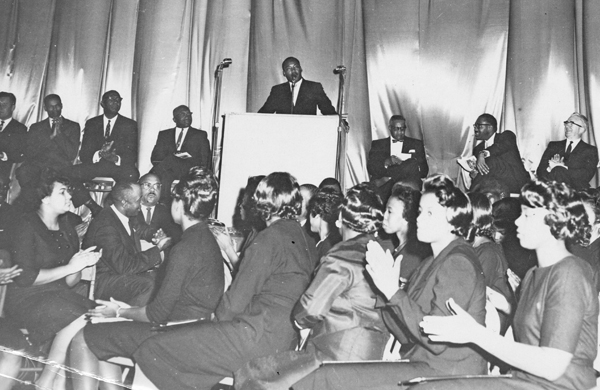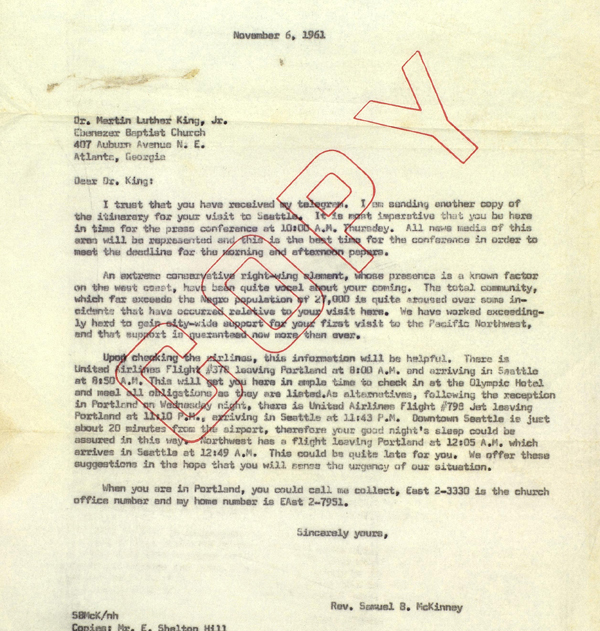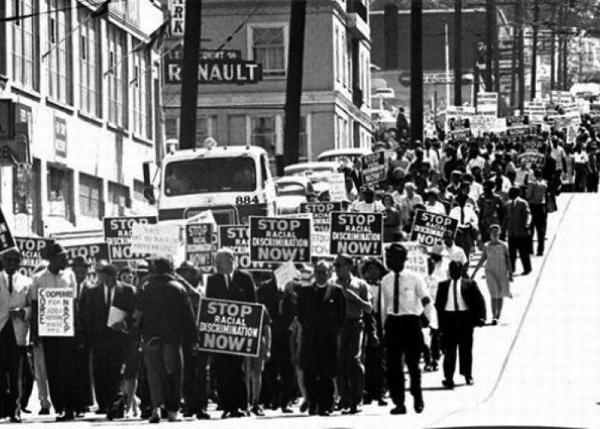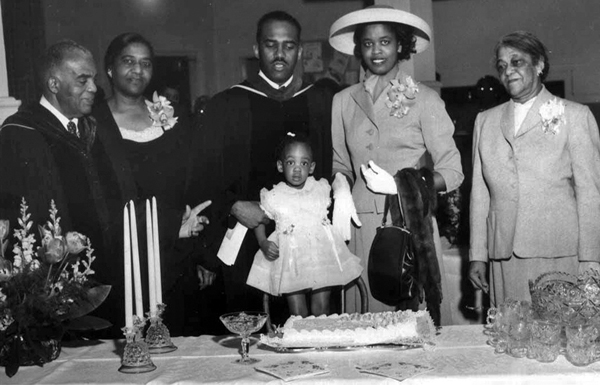`We’re Not in Heaven Yet’: Legacy WA profile on Rev. McKinney
Dr. Martin Luther King, Jr. during his 1961 speech in Seattle. Rev. McKinney invited King to come to Seattle (Photo courtesy Washington State Archives)
Our Legacy Washington program recently launched an important new profile on the Rev. Dr. Samuel B. McKinney, civil rights pioneer and former pastor of Seattle’s Mount Zion Baptist Church. The profile, entitled “We’re not in Heaven yet,” is here.
In honor of Black History Month, we have provided an excerpt of the first few pages of the profile, plus images and materials related to Rev. Dr. McKinney and the civil rights movement in Seattle.
Rev. Dr. McKinney’s letter to Dr. King on his Seattle visit. (Letter courtesy of McKinney family)
They used to say Seattle was a long way from everywhere, a far-flung and hopeful place if you happened to be black. They used to say it was another world from the Deep South where race split society at the core and dark skin could still earn you a lynching.
A 1963 civil rights march in Seattle. (Photo courtesy Seattle Post-Intelligencer)
Samuel McKinney, then on a 30-year walk with God, arrived in the city far from everywhere in the winter of 1957. “The frontier spirit, in a sense, is still alive,” the minister said of the Pacific Northwest. But nearly a century after Lincoln freed millions of slaves, in an ostensibly progressive city, McKinney found freedom elusive. He found blacks banned from restaurants and hotels. He found them in dead-end jobs or unemployed. He found them running from the South and crimes “real or imagined.” The vast majority were confined to four square miles of modest homes—some tidy, some ramshackle—and many built more than 50 years before. Then he began house hunting himself. “Are you colored?” the realtor asked.
McKinney, a third-generation Baptist minister, had grown up in Cleveland, Ohio hearing his father preach the Social Gospel with such fervent passion that it passed down the family tree to him. It rose up years later, on the streets of Seattle, where he led boycotts against companies for refusing to hire minorities and protests against the city for refusing to open housing. The pastor who would one day call attention to the rebellious acts of Jesus—the Lord “raised some Holy Hell,” McKinney would write admiringly—challenged injustice on the streets of his hometown. “The white majority should not decide on my basic rights!” he hollered to thousands on a muddy day in Seattle. When an intimidating church leader in Seattle reneged on plans to host Martin Luther King, Jr., then deemed a radical by whites and blacks alike, McKinney threatened to go public with the truth “so help me God!”
Rev. Dr. McKinney and his family during his first day at Mount Zion Baptist Church. (Photo courtesy McKinney family)
Then he paid a price. He watched garbage cans shatter his windows. He cleaned feces off the glass. He spotted Black Panthers outside his home, their pointed rifles as visible as their black berets. He comforted his anxious daughter when kids on the school bus jeered, “I hear they’re going to kill your daddy.” After a decade, McKinney concluded that racial unrest in the Pacific Northwest didn’t mirror the Deep South, but it “certainly wasn’t the Promised Land.”



